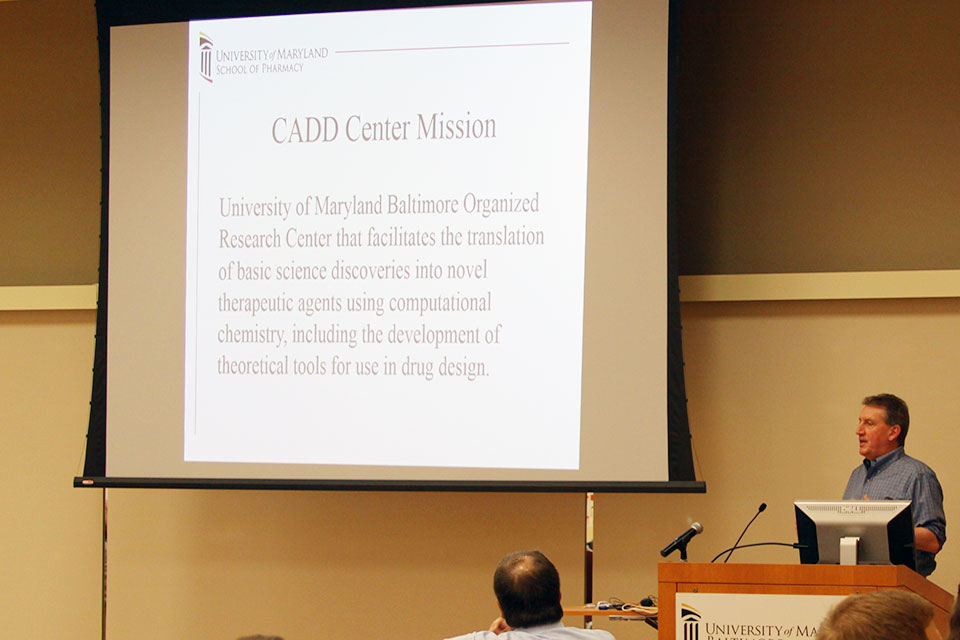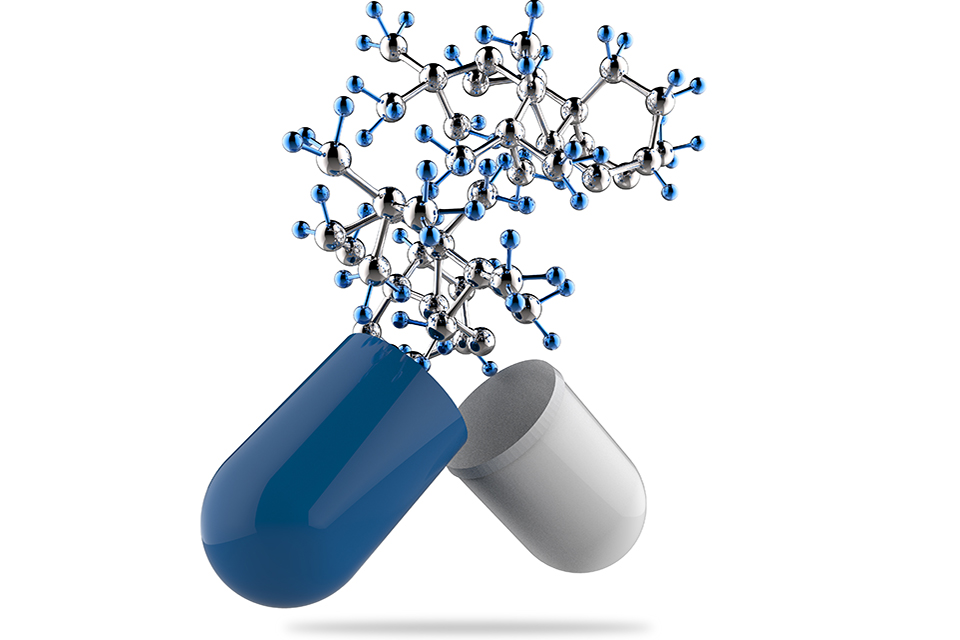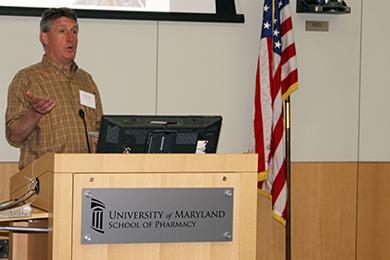2012 Researcher of the Year
Alexander MacKerell Jr., the Grollman-Glick Professor of Pharmaceutical Sciences at the School of Pharmacy, is known to thousands of scientists around the world as the man who built his research program in force field development to an elite level.
By Chris Zang
October 21, 2012
Alexander MacKerell Jr., the Grollman-Glick Professor of Pharmaceutical Sciences at the School of Pharmacy, is known to thousands of scientists around the world as the man who built his research program in force field development to an elite level.
But to assistant professor Steven Fletcher, PhD, MacKerell is a mentor … and a driving instructor.
Such is the wonderful dichotomy of MacKerell, director of the School’s Center for Computer-Aided Drug Design (CADD). He is a world-renowned researcher with the funding, patents, and published works to prove it, yet he is also a giving interdisciplinary colleague and generous University team player.
“He is not one who focuses solely on his own research but is also highly engaged in collaborating with biomedical scientists who may benefit from a computational chemistry component to their research,” says James Polli, PhD, the School’s Ralph F. Shangraw/Noxell Endowed Chair in Industrial Pharmacy and Pharmaceutics. “In his many collaborations, he takes a genuine interest in the science and always gets back to you. In short, he is a fabulous collaborator.”
Peter Swaan, PhD, MS, director of the School’s Center for Nanomedicine and Cellular Delivery, also speaks of MacKerell’s giving nature. “If force field parameters are not available, Alex will ensure that these are developed in his lab and made available to the public in order to serve the wider scientific community,” Swaan says. “More importantly, Dr. MacKerell has a keen interest in translating his scientific discoveries into intellectual property, with three patents and 14 patent applications. Alex is a great colleague and an exemplary faculty member. Outspoken and straightforward, he is always ready to provide a helping hand to junior and senior faculty members alike.”
MacKerell also is invaluable to the graduate students and postdoctoral fellows he mentors. Olgun Guvench, MD, PhD, vice chair of pharmaceutical science at the University of New England, says he wouldn’t be there if not for MacKerell.
“In addition to ensuring that I was a productive member of his laboratory, Professor MacKerell took the time to review and comment on the research proposal I prepared for my faculty position applications,” says Guvench, part of MacKerell’s research group from 2005 to 2009 as a postdoctoral fellow. “This help with the written proposal and the training I received in oral presentation were critical to my learning.”
Fletcher says in addition to the driving lessons, he’s grateful to MacKerell for being “incredibly honest and highly critical of my grant writing. This constructive criticism leads to the proposal being greatly improved and into the funding zone.”
MacKerell’s fondness for higher education and mentoring others comes naturally. His grandfather, Joseph Storlazzi, in the 1930s took a position at what is now Widener University in Chester, PA. His father, Don MacKerell, was one of the original faculty members at Gloucester County College in Sewell, N.J.
“In an academic institution, doing research goes hand-in-hand with training postdoctoral fellows and graduate students,” the junior MacKerell says. “It is the trainees that do a large part of the hands-on research. My commitment to my trainees has allowed my own research program to grow.”
Yes, but driving lessons?
“Steve is a friend as well as a colleague; accordingly giving him driving lessons was not a problem,” MacKerell says with a smile. “In general, I consider many of my colleagues and collaborators friends.”
And they return the sentiment.
“He’s a consummate faculty citizen and team player who advocates for the School, UMB, and its faculty. I personally could not wish for a better colleague,” says Angela Wilks, PhD, vice chair of research at the School of Pharmacy. “He is a leading force on the campus in the development of new technologies and is well recognized by the Office of Research and Development for his work on campuswide committees. Professor MacKerell has recently taken his novel computational methodologies for in silico drug design to start a new company that will further enhance the entrepreneurial partnerships of UM.”
At the School’s CADD Center, MacKerell has used his improved computational models of chemicals to facilitate the identification of novel compounds for development into therapeutic agents for the treatment of pain, cancer, and bacterial infections. His work has been cited by fellow researchers 13,000 times.
“He is one of the most cited computational chemists of his age because his methodological developments have been used extensively by many research groups all over the world,” says Amedeo Caflisch, PhD, a professor at the University of Zurich.
MacKerell and Andrew Coop, PhD, chair of the School of Pharmacy’s Department of Pharmaceutical Sciences, recently announced their discovery of a small molecule that decouples proteins that contribute to a form of cancer known as diffuse large B-cell lymphoma (DLBCL). It is a collaborative project whose groundwork MacKerell attributes to Ari Melnick, MD, an associate professor at Weill Cornell Medical College, and Gil Privé, PhD, professor, University of Toronto. The research findings were published in a 2010 Cancer Cell article, adding to MacKerell’s impressive list of more than 200 publications.
“I’m reasonably confident that the discovery will lead to novel therapeutics for the treatment of DLBCL,” he says. “We are currently working on new compounds that appear to function better than the compounds we’ve already discovered. In addition, there are peptide-based drugs that work via the same mechanism as our compounds that are in clinical trials. Given their success it is likely that our compounds, which are more stable than the peptide-based drugs, will be therapeutically beneficial.”
In her nomination letter, Dean Natalie D. Eddington, PhD, FAAPS, FCP, lauds MacKerell’s “extensive contributions in the area of scholarly activity, his outstanding scientific accomplishments, and the significant impact of his research endeavors.”
In joining others in saying he goes above and beyond, she also mentions his hosting of the annual Computer-Aided Drug Design Symposium, which “brings national and international leaders from diverse areas of the biosciences [academia, industry, governmental agencies]. … It further facilitates interdisciplinary approaches to improve health through the development of new therapeutics.”
Concludes Charles Brooks III, PhD, professor at the University of Michigan, “Alex is a colleague I would love to have at my own institution and one that I often look to for advice in his areas of research expertise. UMB should feel privileged to have Alex as one of its faculty members.”



